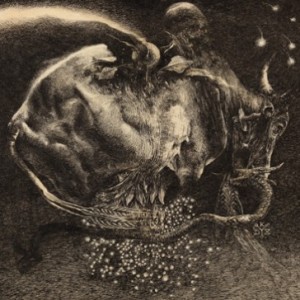 For the uninitiated, Horseback is a difficult band to describe. Principle songwriter Jenks Miller has a powerful songwriting blender in his head, and he’s not one to dabble in bland ingredients. Starting with a musical base that spans the full spectrum of metal, Miller adds equal helpings of drone, ambient, and noise, before spicing things up with a hint of good-old fashioned Americana. The result is something singularly unique in modern music.
For the uninitiated, Horseback is a difficult band to describe. Principle songwriter Jenks Miller has a powerful songwriting blender in his head, and he’s not one to dabble in bland ingredients. Starting with a musical base that spans the full spectrum of metal, Miller adds equal helpings of drone, ambient, and noise, before spicing things up with a hint of good-old fashioned Americana. The result is something singularly unique in modern music.
It’s a recipe Miller has spent several years perfecting. Horseback’s 2010 Relapse debut Invisible Mountain made me an instant fan of the band, as it introduced the band’s metal and kraut rock aspects with tracks like “Tyrant Symmetry,” as well as their ambient side with the track “Hatecloud Dissolving Into Nothing.”
Related Posts
The release of the compilation The Gorgon Tongue, which contained the cassette Forbidden Planet, and the CD Impale Golden Horn brought the rest of Horseback’s back catalog into print. The Gorgon Tongue is dominated by the more ambient and drone stylings of the band. The track “Laughing Celestial Architect” is a particularly standout track, with an ebb and flow of intensity that carries the listener.
Late 2011 saw the release of Horseback’s collaboration with noise/ambient outfit Pyramids for the album A Throne Without a King. In addition to the collaboration, which is a roiling sonic ocean of fuzz, white noise, and subtle ambient, is the standalone Horseback song “Thee Cult Of Henry Flynt.” This track is a blast of oozing, thrashing, vile black metal at its finest, which slows down as it progresses, turning towards the end into a bit of grimy drone.
All of this is but a prelude to Horseback’s most recent release, Half Blood. On Half Blood, the ingredients are the same, but the recipe is more refined. The heavy driving riffs in the opening tracks “Mithras” and “Ahriman” call to mind The Invisible Mountain, with hints of the drone of The Gorgon Tongue. “Ahriman” also gets a bit noodly at one point with a distinctive guitar lead above the rest of the riffing and wailing.
The third track, “Inheritance (The Changeling),” opens with chimes and noise, including a lot of echoing background clinking and clacking before an underlying hum begins. The vibe of the Pyramids collaboration is here early in the track before the ambience takes hold.
The importance of Miller’s vocals cannot be understated. Miller has a distinctive, grim, black metal growl, present on all of Horseback’s recordings, including this one. What is unique about Half Blood is that we also get more of Miller’s clean vocal style, something first introduced to us on The Gorgon Tongue.
If there’s a single on Half Blood, it’s the track “Arjuna,” which has all of the musical elements of the best Horseback tracks — the heavy pounding riffs, the ambience, and the drone — as well as the direct interplay between Miller’s two vocal personae, including a brief duet. Actually, “duet” may not be the correct word; perhaps “daemonic chorus” would be a better descriptor.
Half Blood concludes with a three-part symphonic movement called “Hallucigenia,” with an emphasis on ambient drone. It’s a well-wrought tapestry of sound, conveying a mix of emotions, simultaneously dark and soothing. It’s a fitting conclusion to the album.
What makes Half Blood such a great album is that listening to it is a completely visceral experience. It has what I’d call sonic unity, realizing better than any of the previous albums the pure essence of Horseback. Call that whatever you’d like, but you’d be crazy to call Half Blood anything less than a contender for album of the year.
(Relapse Records, PO Box 2060, Upper Darby, PA 19082)